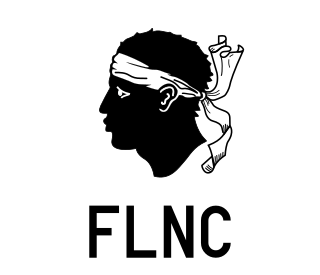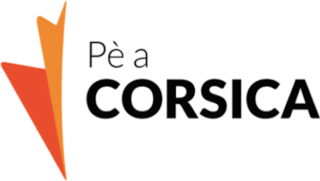
Corsican is a Romance language consisting of the continuum of the Tuscan Italo-Dalmatian dialects spoken on the Mediterranean island of Corsica, a territory of France, and in the northern regions of the island of Sardinia, an autonomous region of Italy.

Filippo Antonio Pasquale de' Paoli was a Corsican patriot, statesman, and military leader who was at the forefront of resistance movements against the Genoese and later French rule over the island. He became the President of the Executive Council of the General Diet of the People of Corsica and wrote the Constitution of the state.

The National Liberation Front of Corsica is a politico-military organization founded in 1976 that advocates an independent state on the island of Corsica, separated from France. The FLNC has been one united organization from 1976 to 1990. In 1990, it split into two factions of comparable size : FLNC-Canal Habituel and FLNC-Canal Historique . Both factions had war between each other and a few dozens nationalists died between 1993 and 1996. Then, there were new merging processes and new splits. In the 2020s, there are still two active and serious FLNCs : the FLNC-Union des Combattants and the FLNC du 22 Octobre. They both signed statements together to revendicate armed actions and to give strategical instructions to the Corsican nationalists. The political party Nazione was founded in 2024 with the support of the FLNC. It is led by Petr'Antu Tomasi, Ghjuvan-Guidu Talamoni and Josepha Giacometti-Piredda, with the participation of the former FLNC political prisoner during 24 years, Carlu Santoni. The FLNC has been active in Corsica but also in French mainland.
Regionalism is a political ideology that seeks to increase the political power, influence and self-determination of the people of one or more subnational regions. It focuses on the "development of a political or social system based on one or more" regions, and/or the national, normative, or economic interests of a specific region, group of regions or another subnational entity, gaining strength from or aiming to strengthen the "consciousness of and loyalty to a distinct region with a homogeneous population", similarly to nationalism. More specifically, "regionalism refers to three distinct elements: movements demanding territorial autonomy within unitary states; the organization of the central state on a regional basis for the delivery of its policies including regional development policies; political decentralization and regional autonomy".

Corsican immigration to Puerto Rico resulted in the 19th century from widespread economic and political changes in Europe that made life difficult for the peasant and agricultural classes in Corsica and other territories. The Second Industrial Revolution drew more people into urban areas for work, widespread crop failure resulted from long periods of drought, and crop diseases, and political discontent rose. In the early nineteenth century, Spain lost most of its possessions in the so-called "New World" as its colonies won independence. It feared rebellion in its last two Caribbean colonies: Puerto Rico and Cuba. The Spanish Crown had issued the Royal Decree of Graces of 1815 which fostered and encouraged the immigration of European Catholics, even if not of Spanish origin, to its Caribbean colonies.
Corsica Nazione was a Corsican nationalist party which aimed to gain control over Corsica from France, regain national rights, and promote the Corsican national identity. Corsica has been French since the Treaty of Versailles (1768) when they were annexed and claim to be repressed culturally, economically, and socially.
The Corsicans are a Romance-speaking ethnic group, native to the Mediterranean island of Corsica, a territorial collectivity of France.

Léo Battesti is a Corsican chess enthusiast, activist, and retired politician and militant.

Corsica is an island in the Mediterranean Sea and one of the 18 regions of France. It is the fourth-largest island in the Mediterranean and lies southeast of the French mainland, west of the Italian Peninsula and immediately north of the Italian island of Sardinia, the nearest land mass. A single chain of mountains makes up two-thirds of the island. As of January 2024, it had a population of 355,528.

The Party of the Corsican Nation is a Corsican nationalist and autonomist political party on the French island of Corsica. It was founded in Corte in 2002 by members of three nationalist parties, Union of the Corsican People (UPC), A Scelta Nova and A Mossa Naziunale.
The Unione Corse is a term designating the Corsican organized crime as a whole during the period 1930s–1970s, in the context of the French Connection, an international heroin trade network operated at that time between Turkey, Southern France, and the United States. A 1972 Time article described the "Unione Corse" as a Corsican-based unified and secretive crime syndicate akin to the American Five Families. The local situation in Southern France during this period was in reality more complex, with a nebula of mainly Corsican and Italian-French clans cooperating or fighting each other according to the circumstances and opportunities. If they constituted a key element of the wider French Connection, flooding the American market with Marseille-produced heroin from the 1950s to early 1970s, those clans remained overshadowed by the much more powerful Italian-American Mafia.
The Group of the European Right was a far-right political group that operated in the European Parliament between 1984 and 1989. It was led by the neo-fascist National Front of Jean-Marie Le Pen. Its members also were the Italian Social Movement and Greek National Political Union. The Ulster Unionist Party was also a member of ER after 1985. ER was succeeded by the Technical Group of the European Right after the 1989 European Parliament election.

Corsican nationalism is the concept of a cohesive nation of Corsica and a national identity of its people. The Corsican autonomy movement stems from Corsican nationalism and advocates for further autonomy for the island, if not outright independence from France.

Corsica Libera is a left-wing separatist political party active in Corsica. It was founded in Corte in February 2009 by members of three nationalist parties, Corsica Nazione, Rinnovu and the Corsican Nationalist Alliance.
The Corsican mafia is a collective of criminal groups originating from Corsica. The Corsican mafia is tied to both the French underworld and the Italian organized crime groups. The Corsican mafia is an influential organized crime structure operating in France, as well as North African and Latin American countries.

The French conquest of Corsica was a successful expedition by French forces of the Kingdom of France under Comte de Vaux, against Corsican forces under Pasquale Paoli of the Corsican Republic. The expedition was launched in May 1768, in the aftermath of the Seven Years' War. A French expeditionary force was landed on the island of Corsica, then ruled by the Corsican Republic. Marching inland to overcome any Corsican opposition, the French force initially suffered an unexpected defeat at the Battle of Borgo. But a new commander, the Comte de Vaux, was appointed to lead the expedition, and decisively defeated the Corsican army at the Battle of Ponte Novu in 1769, effectively bringing an end to Corsican resistance.

The 2015 Corsican protests were a series of marches by several hundred Corsican nationalists that began on 25 December, in Ajaccio, capital of Corsica. During the initial demonstrations, a Muslim prayer hall was burned down and Qur'ans were set alight. Further protests were organised after the initial march despite a government ban on protests until 4 January 2016. The protesters claimed to be acting in revenge for an incident that occurred the day prior when firefighters and police were assaulted in the neighbourhood of Les Jardins de l'Empereur; however, outside observers labeled the ensuing riots as anti-Arab and anti-Muslim. The Corsican nationalist politicians have claimed their view does not legitimise xenophobia, blaming the protest on French nationalism instead. Scholarly opinions on this claim are divided.

Pè a Corsica was a Corsican nationalist political alliance in France, which was calling for more autonomy for Corsica. More specifically, it was a coalition of the two Corsican nationalist parties active on the island; that is, the moderately autonomist Femu a Corsica and the strongly committed separatist Corsica Libera. The party was led by the autonomist Gilles Simeoni. The alliance was renewed for the 2017 territorial election. However, the alliance was dissolved for the 2021 territorial election.

Femu a Corsica is a Corsican autonomist political party. It was formed for the first time prior to the 2010 French regional elections in the form of a political coalition. The coalition members, Inseme per a Corsica, the Party of the Corsican Nation (PNC) and Chjama Naziunale, merged during the founding congress of the party in Corte on 15 October 2017. The PUDEMU movement also merged into the new party. The PNC was later re-established in 2019. The leader of the party is Gilles Simeoni.












